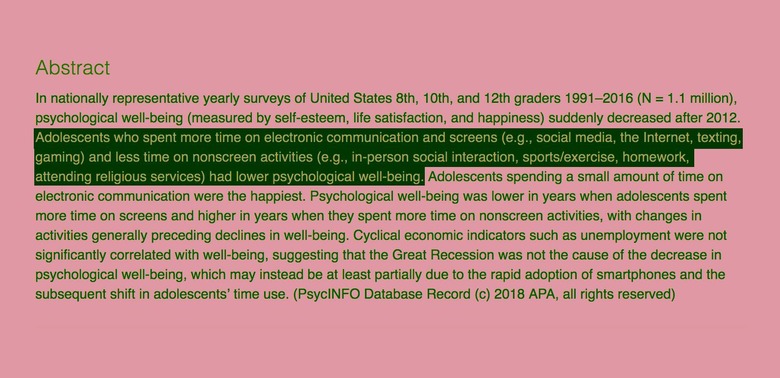Report: Screens Are Killing Our Happiness
Smartphones were the leading cause of a major fall in psychological well-being in American Adolescents after the year 2012 according to a new study. This study was conducted by researchers at The University of Michigan, and was published in the scientific journal Emotion this week. The study showed that adolescent self-esteem, life satisfaction, and happiness rose between 1990 and 2011, then fell dramatically starting in the year 2012, just as smartphones began to take hold of the planet.
This study was lead by Jean Twenge, a professor of psychology at San Diego State University. "We found that teens who spent more time seeing their friends in person, exercising, playing sports, attending religious services, reading or even doing homework were happier," said Twenge. "However, teens who spent more time on the internet, playing computer games, on social media, texting, using video chat or watching TV were less happy."

Twenge wrote a companion piece on The Conversation with links to a bevy of additional studies on the subject. In one paper on SSRN, it was found that young adults "required to give up Facebook for their jobs" were then happier than their counterparts who kept the social network in their lives.
"Screen time leads to unhappiness but unhappiness doesn't lead to more screen time." – Twenge, SDSU
Another study posted with PubMed with NCBI showed that "the use of Facebook was negatively associated with well-being." The same study found, as Twenge put it, "screen time leads to unhappiness but unhappiness doesn't lead to more screen time."
Twenge and crew also found that cyclical economic indicators were not significant in a adolescents' psychological well-being. This study was performed during the time of the Great Recession and recovery and found that this period, and the loss of jobs in general, were not a significant cause of decrease in psychological well-being. They noted, however, that this "may instead be at least partially due to the rapid adoption of smartphones and the subsequent shift in adolescents' time use."
This study was conducted on approximately 1.1-MILLION students in the United States between the years 1991-2016. Yearly surveys were conducted of 8th, 10th, and 12th-graders as such. These surveys aimed to find measurements of psychological well-being (that is, self-esteem, life satisfaction, and happiness.) This study analyzed data gathered from Monitoring The Future conducted by the University of Michigan.
For more information on the main bit of research featured above, see the paper "Decreases in Psychological Well-Being Among American Adolescents After 2012 and Links to Screen Time During the Rise of Smartphone Technology" by Twenge, J. M., Martin, G. N., and Campbell, W. K. (2018). This paper was posted to APA PsyxNET (the American Psychological Association) as part of an advanced online publication of the journal Emotion, and can be found with code http://dx.doi.org/10.1037/emo0000403.
